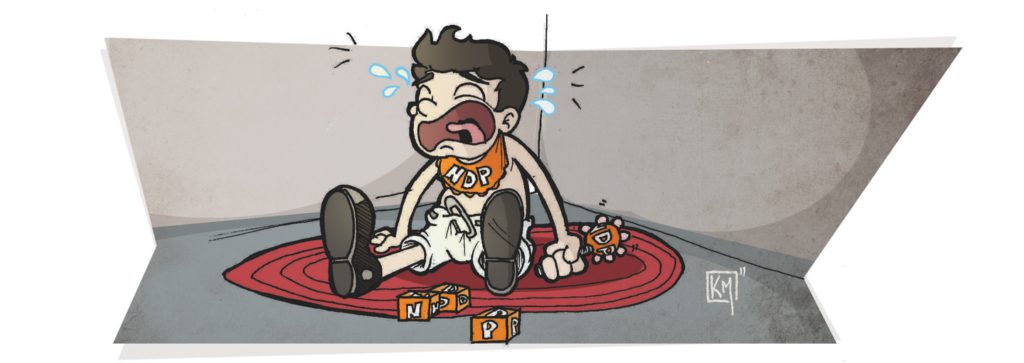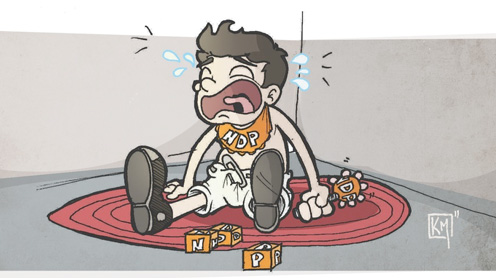John Nyman
Senior Staff Writer
When I got home from work on election day and turned on the TV, I flipped my shit.
But unlike many of my friends and fellow students, who spent the days after the election complaining about impending Conservative legislation and other shit Harper did (the website shitharperdid.ca had left-wingers laughing bitterly throughout the campaign), my reaction was that of pure excitement.

Last decade’s underdog, the Conservatives, finally got their day in the sun. The Liberal Party suffered their most crushing defeat ever. Federal separatism died in Québec. The New Democratic Party (NDP), which has been among the most ridiculed political entities in the country for years, became Canada’s official opposition. What more could you ask for from the indisputable summer blockbuster of Canadian elections?
Armchair commentators who complain about the Conservatives’ free hand in governing the country over the next few years have a point: winning a majority government, or over half the seats in the House of Commons, means that Harper can institute policies that would cut taxes and beef up law enforcement and the armed forces with little to stop him.
But the fact is, through monumental shifts in the number of seats every major party holds, Canada’s political landscape has changed forever. And while it’s the majority government that makes decisions in the short term, it’s the opposition that makes history.
Probably the biggest story of this election is the collapse of the Liberal Party, which finished third for the first time in Canadian history. Their loss is astounding: having won only 34 seats compared to the NDP’s 102, they’ve practically reversed 2008’s distribution of left-wing seats (where 77 Liberal candidates were elected alongside 37 of the NDP’s). Going back just a few more years, the difference is even more tremendous: the Liberals won 135 seats in the 2004 election and 172 in 2000 (their last majority).
Michael Ignatieff himself called the loss “historic”, and it looks like Liberal members and supporters will have to do a lot of rethinking in the coming years.
Almost equally amazing is the incredible success of the NDP, which has now replaced the Liberals as Canada’s official opposition. But while the 65-seat jump of a party that has been bashed for decades— as unnecessary, radical or simply a waste of votes— is invigorating enough, the NDP’s new support base is another story.
Historically, the NDP has drawn their support from Ontario, British Columbia and Manitoba, but now over half of their 102 Members of Parliament hail from Québec. Many of these members, including five McGill students who will surely see a dramatic increase in their salaries, have little experience in politics. The influx of fresh faces could bring dramatic new ideas to NDP policy, but they could also prove disastrous for party leader Jack Layton to manage.
Either way, the NDP is faced with making the jump from being a primarily Anglophone party to a thoroughly bicultural party, requiring them to adapt to the different needs of politics in Québec.
The Québec issue is also at the centre of the third monumental consequence of the 2011 election: the failure of the Bloc Québécois.
For over a decade, the Bloc has held between 38 and 54 seats in Québec. Today, they hold four. Meanwhile, Gilles Duceppe, the party’s longtime leader and a refreshing addition to the last several elections’ official debates, failed to retain his seat and left the party.
With the loss, there is no longer a strong federal party specifically representing Québec’s interests or pushing towards separation. Instead, the NDP is faced with taking on the concerns of Québec voters. There are two sides to the new situation: on one hand, the province’s concerns are now located in a nationally represented opposition party. On the other, their issues fall into the hands of a party with little experience in Québec. The effect on NDP policy and the continuing instability of Québec voters remain to be seen.
While it’s far beyond my expertise to predict the future of Canadian politics, it’s clear to me that big changes are in the works. Aside from these power shifts in the country’s major parties, this election saw other changes such as an increase in voter turnout (albeit a slight one) and the election of a record number of female MPs including the Green Party’s first representative, party leader Elizabeth May.
Even more significant for me, though, is my hope for a real change in the political attitude of Canadians following one of the most boring decades in Canadian political history. I worked as a poll clerk on election day and was surprised by the results at my poll: votes were split almost evenly between the three major parties, and even the Green Party candidate received some support. The experience gave me hope that politics can still be important to Canadians.
I think my polling station’s deputy returning officer, who has been involved in politics for decades, summarized it best: “It shows people are thinking.”
The better side of blue


